PBM Reform Podcast
Pharmacy benefit managers were created as middlemen to reduce administrative costs for insurers, validate a patient’s eligibility, administer plan benefits, and negotiate costs between pharmacies and health plans. Over time, PBMs have been allowed to operate virtually unchecked. A lack of transparency in PBM practices has led several states to implement licensure/registration, fair pharmacy audit, or generic drug pricing legislation to try to level the playing field for pharmacies and patients. by the NCPA https://www.ncpanet.org/advocacy/state-advocacy/pbm-reform This Podcast is focusing on discussions & interviews about PBM Reform & those ”Business of Pharmacy” professionals leading this much needed reform.
Pharmacy benefit managers were created as middlemen to reduce administrative costs for insurers, validate a patient’s eligibility, administer plan benefits, and negotiate costs between pharmacies and health plans. Over time, PBMs have been allowed to operate virtually unchecked. A lack of transparency in PBM practices has led several states to implement licensure/registration, fair pharmacy audit, or generic drug pricing legislation to try to level the playing field for pharmacies and patients. by the NCPA https://www.ncpanet.org/advocacy/state-advocacy/pbm-reform This Podcast is focusing on discussions & interviews about PBM Reform & those ”Business of Pharmacy” professionals leading this much needed reform.
Episodes
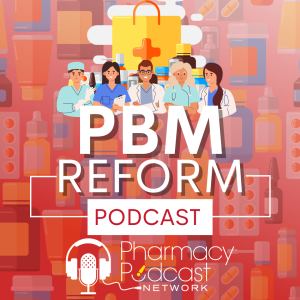
Thursday Nov 02, 2023
The Volunteer State takes a Stand on PBMs | PBM Reform
Thursday Nov 02, 2023
Thursday Nov 02, 2023
Featuring Tennessee State Senator & Pharmacist Shane Reeves"The Volunteer State" has been a Tennessee nickname since the 19th century but wasn't officially voted on until February 2020. Tennessee sent 1,500 volunteer soldiers during the War of 1812, and the nickname stuck.Requiring PBMs to contract with rural independent pharmacies: In Tennessee, there are 70 counties considered rural out of the 95 counties in the state. Tennessee lost 15 rural hospitals over the last few years, so healthcare access is an issue. Most of these towns have a community pharmacy which is the access point for a lot of health care and health care information for many Tennesseans. About Shane Reeves: Man of Faith, Husband, Father, CEO, Pharmacist, Public Servant (TN State Senator)As CEO of TwelveStone Health Partners, Shane's mission is to be the regional leader in post-acute chronic care pharmacy management, placing patients and their families at the center of everything he does. As faithful stewards, Shane leads his team to strive every day to glorify God.
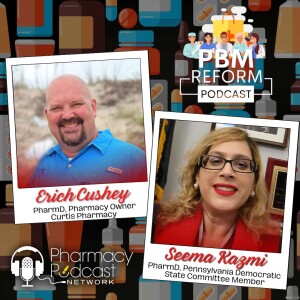
Thursday Oct 19, 2023
PBM Reform Efforts Stalled in Congress | PBM Reform
Thursday Oct 19, 2023
Thursday Oct 19, 2023
In the Senate, there are 3 committees that have advanced legislation on PBM reforms, with leadership supporting a floor vote before the end of 2023. In the House, a consolidated bill was released in September and although there are plans for a full House vote, they are stalled due to the current issues in Congress.There are 3 key jurisdictions and proposed plans of the Senate that focused on in the session: The Finance Committee, including Medicare and Medicaid; the Health, Education, Labor, and Pension (HELP) Committee, including plans that regulate under the Employee Retirement and Income Security Act and the Affordability Care Act; and the Commerce Committee, including interstate commerce and the Federal Trade Commission (FTC).
The Finance Committee Package includes the prohibition of spread pricing in Part D for Medicaid and Medicare managed care. The Part D rebates must also be passed through the prescription drug plan sponsors, used to lower the costs for prescription drugs with a 100% pass-through in Medicaid managed care, according to Andel.Reference:https://www.pharmacytimes.com/view/amcp-session-provides-updates-on-pbm-reform-efforts-currently-stalled-in-congress GuestsErich Cushey PharmD - Pharmacy Owner Curtis Pharmacy Seema Kazmi, PharmD Seema currently serves on the Board of the Pennsylvania Pharmacists Association as a Practice Setting Director for pharmacists in Managed Care, Pharmaceutical Industry, Government Affairs and other practice settings. Dr. Kazmi has been a pharmacist for over 17 years and started her pharmacy career as an overnight community pharmacist in Levittown, Pa. Dr. Kazmi is a graduate of Philadelphia College of Pharmacy and is a licensed pharmacist in six states, serving in leadership and management roles in managed care, pharmaceutical industry, community pharmacy, long-term care, and public service. Seema Kazmi, PharmD currently serves on the Board of the Pennsylvania Pharmacists Association as a Practice Setting Director for pharmacists in Managed Care, Pharmaceutical Industry, Government Affairs and other practice settings.
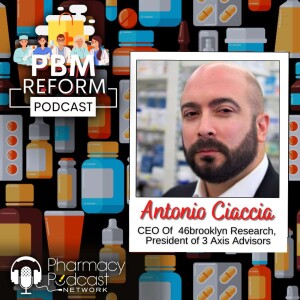
Saturday Oct 14, 2023
MISSION CRITICAL: Reform the Mysterious PBM System with Antonio Ciaccia | PBM Reform
Saturday Oct 14, 2023
Saturday Oct 14, 2023
Antonio Ciaccia is the President of 3 Axis Advisors. He was born and raised in pharmacy, Antonio has been crawling around pharmacies his entire life. After three years as a pharmacy technician and two years of pre-pharmacy curriculum, Antonio diverted course, graduating from The Ohio State University in 2007 with dual degrees in communications and political science before moving into the world of association management.3 Axis Advisors brings unique approaches to address the individual needs of each or our clients. As researchers and investigators at heart, 3 Axis endeavors are laser-focused on discovery through data-driven analysis and deep industry expertise, resulting in innovative and unique solutions.
Our obsessive passion for understanding complex systems and our immersion in the prescription drug supply chain and the broader healthcare delivery system enables us to arm our clients with the tools they need to accomplish their goals.Reference: Ohio regulator’s proposed pharmacy rules draw mixed response New regs meant to promote safety at understaffed storeshttps://ohiocapitaljournal.com/2023/10/02/ohio-regulators-proposed-pharmacy-rules-draw-mixed-response/
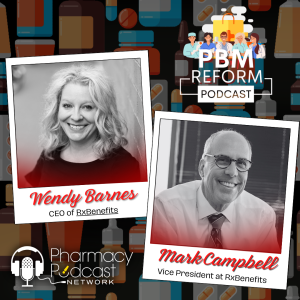
Monday Jul 10, 2023
Reigning In Out of Control Drug Costs | PBM Reform Podcast
Monday Jul 10, 2023
Monday Jul 10, 2023
Our special guest Wendy Barnes, CEO of RxBenefits and Mark Campbell, the VP of RxBenefits. From BenefitsPro:https://www.benefitspro.com/2023/03/27/how-dispelling-mistrust-of-generics-will-help-patients-and-plan-sponsors/?slreturn=20240222125659 Health care spending in the United States has increased substantially the past few years, and it isn't likely to slow down any time soon. At this rate, national health care costs could reach $6.2 trillion by 2028. A number of factors, including the cost of medical supplies and drugs, contribute to those rising numbers. The financial pinch many people were already feeling has been intensified by the unsteady economy, leading consumers to call for lowered health plan costs whenever and wherever possible. Some believe reducing prescription drug spending is an easy way to do that. But consumers still deserve access to the medications they need at prices they can afford.
Generic medications: A solution to potential challenges
Using generic medications in place of high-priced, brand-name drugs offers the same clinical benefits, and it can save patients and health plan providers significant money in the long run. It's a convenient, simple way to reduce costs while making sure patients have continued access to the treatments and medicines they've been prescribed. But while generics are an obvious answer to many challenges facing the industry, they aren't embraced nearly as often as they should be. According to U.S. Pharmacist, "While generic drugs are extensively prescribed … t some consumers are still hesitant about using generic drugs and believe that they are not as safe or effective as brand-name drugs."
Consumers have a variety of reasons for their misgivings, but the skepticism is unwarranted. Many health plan administrators and pharmacy benefit optimizers are working to dispel the myths that can rob consumers of significant savings.
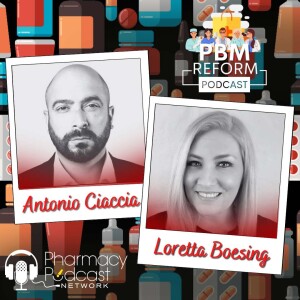
Thursday Jun 15, 2023
Titans for PBM Reform: Loretta Boesing & Antonio Ciaccia | PBM Reform
Thursday Jun 15, 2023
Thursday Jun 15, 2023
House Energy and Commerce Committee cleared a PBM bill that seems to contain more transparency loopholes and makes more limited policy tweaks to the drug supply chain middleman than the Senate HELP Committee’s bill, but the House-side legislation would pull back the curtain on specialty-drug reimbursement in a way the Senate version does not. Two titans of PBM Reform join us today, returning guest Antonio Ciaccia with 3 Axis Advisors and Loretta Boesing with Unite for Safe Medications update our PBM Reform Podcast listeners with the latest progression in PBM Reform. Reference: PBM Reform: Vertical Integration, Specialty Drug Tracking Among Differences In House v. Senate Billshttps://pink.pharmaintelligence.informa.com/PS148320/PBM-Reform-Vertical-Integration-Specialty-Drug-Tracking-Among-Differences-In-House-v-Senate-Bills
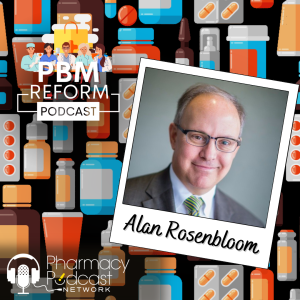
Tuesday Mar 21, 2023
Alan Rosenbloom | SCPC | PBM Reform Podcast
Tuesday Mar 21, 2023
Tuesday Mar 21, 2023
Let's talk about the current state of the industry.Senior Care Pharmacy Coalition: SCPC just missed getting the LTC Pharmacy Definition passed last year. The PBM issues continue, even with gov't interest and involvement. Let's discuss LTC pharmacy's value to dual-eligibles, and how some simple policy changes would improve care for this population and save the system millions of dollars, overall. Let's talk about how LTC pharmacies are in an increasingly tough spot because or drug pricing policies. The patients they serve often rely on price-controlled meds that often leave them serving at a loss.
This episode is sponsored by FRAMEWORK LTC: For more information visit frameworkltc.com
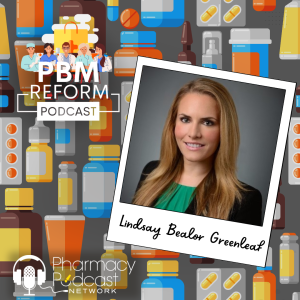
Tuesday Mar 07, 2023
FTC Cornering PBMs to Improve Pharmacy Care | PBM Reform
Tuesday Mar 07, 2023
Tuesday Mar 07, 2023
Special Guest:Lindsay Bealor Greenleaf, J.D., M.B.A.,Vice President and Head of Policy with ADVI Health Inc.Why now: This week U.S. Sens. Chuck Grassley (R-IA) and Maria Cantwell (D-WA) introduced two bills that seek to hold pharmacy benefit managers (PBMs) accountable for opaque practices that contribute to high drug prices for consumers.
Expert commentary: Lindsay Bealor Greenleaf, J.D., M.B.A., vice president and head of policy with ADVI can dive deep into a discussion on PBMs expanding on the following points:
1) PBMs were completely spared in the IRA while the people who actually make drugs got hit with unprecedented government price setting
2) Fortunately, PBMs will now face scrutiny on the Hill, including Prescription Pricing for the People Act (S. 113) and the PBM Transparency Act (S. 127) with new bills and “noisy” hearings
3) PBMs are also in hot seat with the FTC (from Lindsay’s perspective, the FTC is “incredibly hostile towards PBMs right now”)
Are these topics areas you’d like to explore? If yes, I’d like to line up a time for you to connect with Lindsay in the coming weeks. I look forward to your feedback on your interest in a podcast episode with our ADVI experts.
Reference:
State Legislatures Lead the Way on Policy Reform to Protect Personalized Medicine
Feb 22, 2023Angela Storseth-CooperLalan Wilfong, MD
https://www.ajmc.com/view/state-legislatures-lead-the-way-on-policy-reform-to-protect-personalized-medicine
In Blow to PBMs, CMS Floats Reform of Part D Price Concessions
https://www.mmitnetwork.com/aishealth/spotlight-on-market-access/in-blow-to-pbms-cms-floats-reform-of-part-d-price-concessions-2/
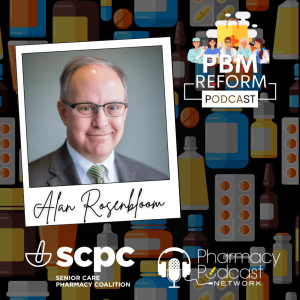
Wednesday Nov 02, 2022
Did Tricare & Express Scripts put profits over patient care? | PBM Reform Podcast
Wednesday Nov 02, 2022
Wednesday Nov 02, 2022
The Express Scripts decision removes the option for Tricare beneficiaries to get prescriptions at the pharmacies of their choice. The National Community Pharmacists Association (NCPA) CEO B. Douglas Hoey, PharmD, MBA, warns that “access to needed medications for Tricare beneficiaries is in peril.”
This decision is estimated to impact hundreds of thousands of beneficiaries relying on certain pharmacies (or locations) to get prescriptions—those who cannot get their prescription at the pharmacy of their choice may fall out of care.
Consequently, patients may lose access to the potentially lifesaving treatments that specialty and independent pharmacies can provide, especially for patients with critical illnesses such as HIV, among other illnesses.
In a recent analysis, experts suggested that the contract, made with the US Department of Defense (DOD), could shrink the retail pharmaceutical network by 15,000 pharmacies.
Guest
Alan Rosenbloom
President & CEO
Senior Care Pharmacy Coalition
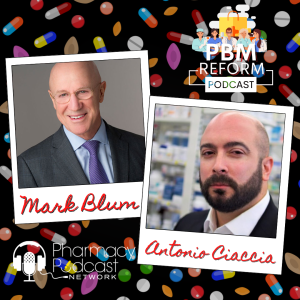
Tuesday Oct 04, 2022
How will the Inflation Reduction Act Impact PBM Reform? | PBM Reform Podcast
Tuesday Oct 04, 2022
Tuesday Oct 04, 2022
Today we are hoping to make sense of the Inflation Reduction Act which is designed to protect Medicare recipients from catastrophic drug costs by phasing in a cap for out-of-pocket costs and establishing a$35 cap for a month's supply of insulin. And, as an historic win, Medicare will be able to negotiate prices for high-cost drugs for the first time ever.
Guests:
Mark Blum
Mark is the Executive Director of America's Agenda, an organization he’s led since its founding in 2005. America's Agenda is a national healthcare alliance that brings together labor unions, businesses, healthcare providers, and policymakers who share a common commitment to smart policy and effective action to advance our mission of affordable, high-quality, readily accessible healthcare for every American. Mark currently serves on the State Health Benefits Value and is a former member of the Quality Task Force in New Jersey and previously worked as an economics professor as well as national director of organizing for the American Association of University Professors. He completed his graduate studies at the London School of Economics.
A major focus for Mark in recent years has been the Pharmacy Benefit Manager issues facing our country. Mark is a founding member of the PBM Accountability Project. He works tirelessly to educate the public and advance solutions to help redirect prescription drug savings from very high PBM profits back to patients, employee health plans, and taxpayers.
Antonio Ciaccia
Antonio Ciaccia (cha-cha) is the President of 3 Axis Advisors, a firm that among many things studies drug pricing. He was recently featured on NBC’s Today Show talking about the lengths PBMs force independent pharmacies to go to find savings for their patients. He’s also spoken publicly about PBMs in the context of the Inflation Reduction Act. Antonio has been in and around pharmacies his entire life. A graduate from The Ohio State University in 2007 with dual degrees in communications and political science. For six years he headed up government affairs for the Ohio Pharmacists Association. After years of studying the pharmacy marketplace, Antonio became increasingly perplexed and concerned as he saw drug costs spiking while payouts to pharmacies were declining. Knowing something was being lost somewhere in the middle of an ever-growing transaction, Antonio has spent years working to crack the drug pricing code and pull the rug out from what he believes is one of the most dysfunctional marketplaces in the world.
Learn more about your ad choices. Visit megaphone.fm/adchoices
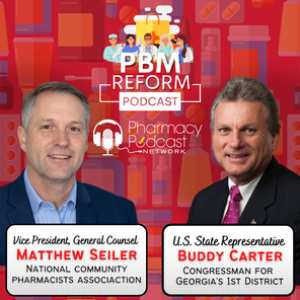
Friday Jul 22, 2022
Friday Jul 22, 2022
Congressman Buddy Carter and General Counsel of NCPA Matthew Seiler on PBM Reform. On this episode of the 'PBM Reform Podcast' we discuss the Pharmacy Benefit Manager (PBM) Transparency Act of 2022 (the Act) was recently proposed in the U.S. Senate and intends to incentivize “fair and transparent” PBM practices, prohibit spread pricing and claw backs of payments to pharmacies, and empower the Federal Trade Commission (FTC) and state attorneys general in enforcement actions to stop “unfair and deceptive” PBM business practices.
The Act was introduced by Senators Maria Cantwell Chuck Grassley on May 24, 2022, and was approved by the Commerce Committee with bipartisan support (19-9) on June 22, 2022. This summary provides a high-level overview of the Act’s key measures.
Prohibition on Unfair or Deceptive Prescription Drug Pricing Practices
The Act would make it illegal for PBMs to:
Engage in “spread pricing,” which is described as charging a health plan or payer a different amount for a prescription drug’s ingredient cost or dispensing fee than the amount the PBM reimburses a pharmacy for the prescription drug’s ingredient cost or dispensing fee where the PBM retains the amount of any such difference;
Arbitrarily, unfairly, or deceptively reduce or rescind (a.k.a. “claw back”) any portion of the reimbursement payment to a pharmacist or pharmacy for a prescription drug’s ingredient cost of dispensing fee; or
Arbitrarily, unfairly, or deceptively increase or lower fees and reimbursements to a pharmacy to offset reimbursement changes under any federally funded health plan.
The Act would incentivize transparency by stating that a PBM shall not be in violation of the Act if the PBM passes through 100% of price concessions to a health plan or payer and provides complete disclosure of:
The cost, price, and reimbursement of prescription drugs to each health plan, payer, and pharmacy;
All fees, markups, and discounts the PBM charges or imposes on each health plan, payer, and pharmacy; and
The aggregate remuneration PBM receives from drug manufacturers, including nay rebate, discount, administration fee, and any other payment or credit obtained or retained by PBM.
Learn more about your ad choices. Visit megaphone.fm/adchoices

Thanks for Listening!
The Pharmacy Podcast Network team would like to thank you. Our success could not be possible without our listeners!
For more content, visit pharmacypodcast.com
